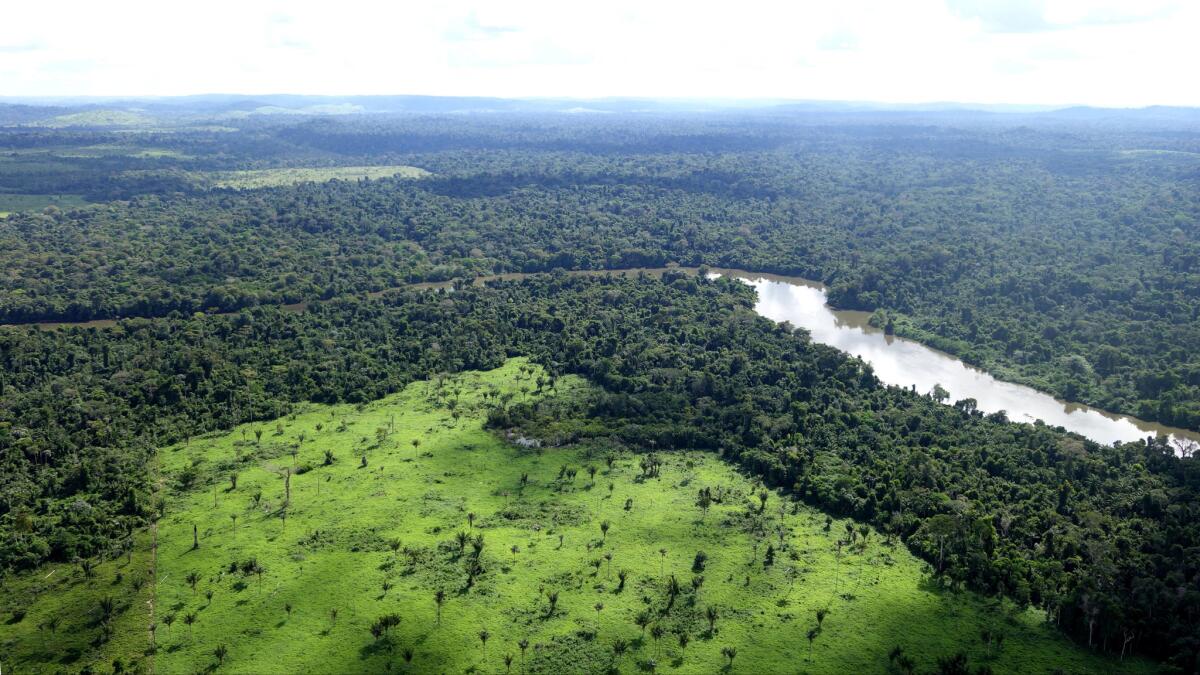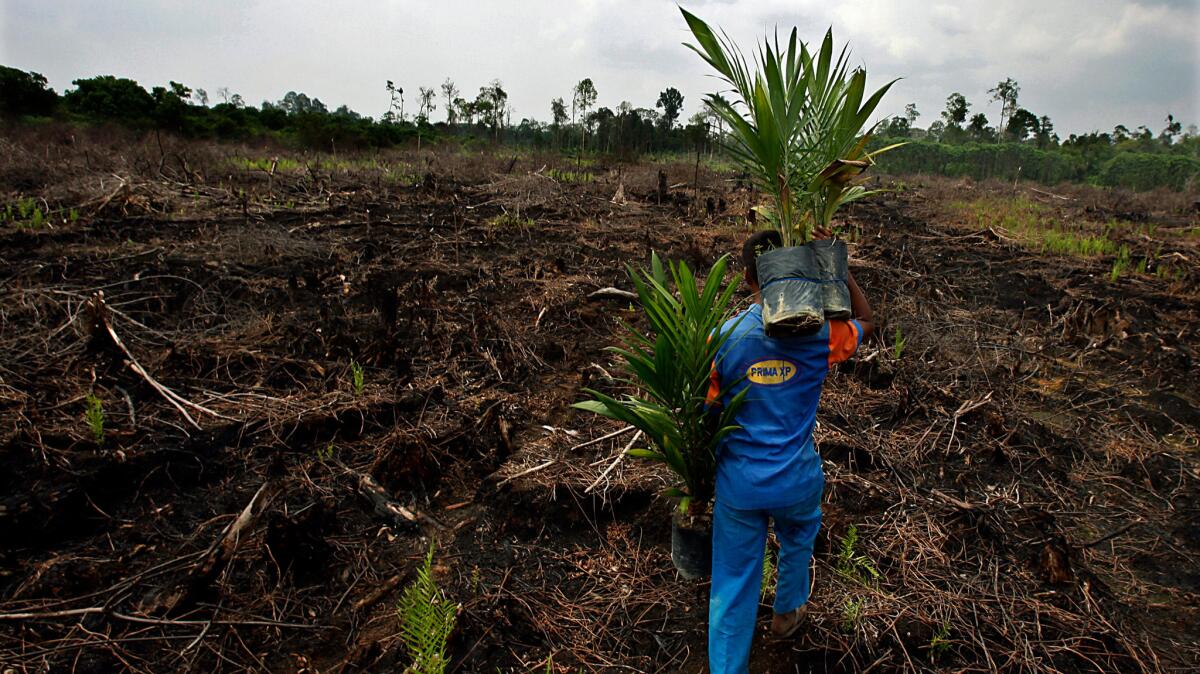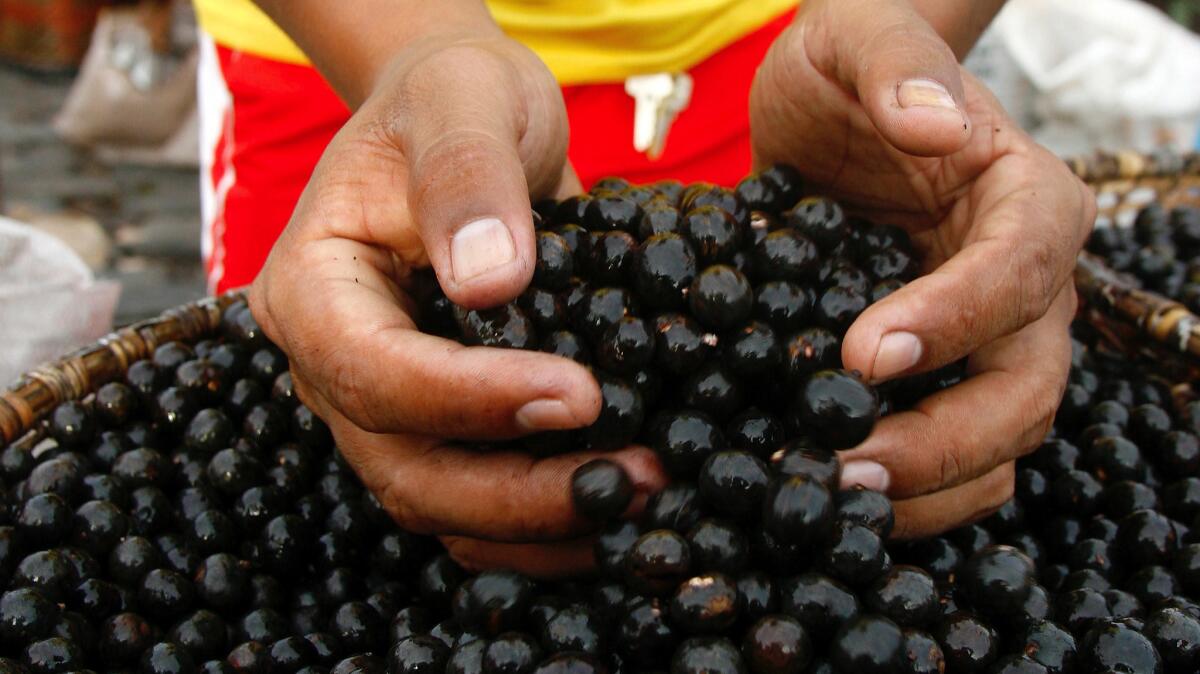Op-Ed: California should take the lead on protecting tropical forests

- Share via
In Sacramento, an opportunity is pending that could make a huge difference to achieving climate stability and sustainable development goals on a global scale.
California could take the lead in demonstrating an innovative approach to reducing tropical deforestation. And the benefits would accrue not only to the people who live in or near tropical forests, and not only to others in developing countries who will suffer the worst impacts of climate change, but also to the people of California.
It starts with standing tropical forests—the largest of which is the Amazon—which absorb carbon dioxide as they grow. They offer the world’s only safe, natural and proven technology for removing carbon from the atmosphere. When forests are destroyed, carbon dioxide is released to the atmosphere, and the trees that would remove the carbon from the air are taken out. Climate change accelerates as a result.
If all emissions from tropical deforestation were assigned to one country, it would rank third after China and the United States on the list of the world’s biggest polluters. In October 2015, the forest and peat fires in Indonesia alone released more CO2 on a daily basis than the entire U.S. economy.

Reducing tropical deforestation is critical to lessening the impacts of climate change, which is something all Californians should appreciate. While scientists still cannot pinpoint whether climate change causes a specific weather event, they have shown how global warming has exacerbated the effects of extreme weather patterns.
Researchers at Columbia University, for example, have estimated that the drought in California was up to 27% worse between 2012 and 2014 because of climate change.
The 2015 Paris Agreement on climate change recognizes the problem of deforestation and endorses an approach in which rich countries provide results-based payments to developing countries to reward forest conservation. Negotiators have agreed on principles to ensure that forest emission reductions are real, accurately measured and do no harm to vulnerable communities such as indigenous peoples.
Reducing deforestation offers a double dividend, because forest conservation is also necessary for achieving many development goals. Forested watersheds provide clean water for drinking, irrigation and hydropower generation. Natural forest vegetation is more resilient to the extreme weather events that cause droughts, floods, and fires that are expected to become more frequent and severe with climate change.
Dozens of developing countries—and states and provinces within those countries—have stepped forward to do their part. One such state is Acre, a forest-rich state in Brazil, which has developed an innovative state-level approach to low emissions development based on valuing forests as environmental assets.
Acre’s approach zones areas for different kinds of economic activity and compensates landowners for their conservation efforts. In addition, Acre is developing forest-friendly industries—including a natural rubber condom factory and cultivation of the acai berry used to flavor Absolut vodka—that leave the tropical forests standing.

Here’s where California comes in again. The state has long been a pioneer in leading-edge environmental policies, and the cap-and-trade system managed by the Air Resources Board (ARB) under the California Global Warming Solutions Act, AB32, is already making a significant contribution to reducing emissions.
In a cap-and-trade system, regulated industries are issued a limited allowance to pollute. Companies can either reduce their emissions below the limit and sell excess allowances, or they can purchase surplus allowances from other companies to “offset” excess emissions.
The ARB could propose to include in California’s system offsets from tropical jurisdictions such as Acre that successfully reduce carbon emissions from deforestation. In other words, regulated companies in California could meet part of their obligation to reduce emissions by purchasing credits generated by protecting tropical forests.
The revenues from these purchases would then support the payments made through Acre’s program and others like it. Because such credits are often less expensive than alternative ways of reducing emissions, their inclusion in the system can reduce the overall costs of compliance with regulations.
If such a proposal were approved, California’s program would be the first to provide market-based demand for such tropical forest-based emission reductions. As the precedent-setter, the state could establish high standards for forest-carbon transactions based on international safeguard principles.

Although some groups have opposed offsets due to concern about possible adverse impacts on local communities, representatives of indigenous peoples from Acre and other jurisdictions have gone on record as welcoming the initiative. Other carbon markets currently under development would likely emulate California’s strong standards, multiplying the impact of the program.
California’s action would send a signal that successful efforts to conserve tropical forests will be rewarded. Many political leaders have been awaiting such a signal since 2008, when Gov. Arnold Schwarzenegger first convened what became the Governors’ Climate and Forests Task Force.
The group now includes members from states and provinces in Brazil, Indonesia, Ivory Coast, Mexico, Nigeria and Peru. In 2014, participating governors offered to reduce deforestation up to 80% in return for international financial support. A transaction between California and Acre, both members of the task force, would rekindle enthusiasm among many others.
In addition, sourcing of forest carbon offsets from states and provinces in the tropics would complement recent corporate commitments to ensure that commodities such as beef and soy are not produced at the expense of forests.
In Paris in December, Unilever, Marks & Spencer and other leading companies pledged to give priority to jurisdictions demonstrating progress in reducing deforestation when making sourcing decisions. Demand for forest carbon offsets combined with demand for “deforestation-free” commodities could help tip the balance of incentives toward conservation.
By launching the first market for reduced tropical deforestation, the Air Resources Board’s initiative in Sacramento would be a giant step toward realizing the ambitious climate goals agreed in Paris, as well as the hopes of forest stewards in Acre and throughout the developing world. Still in the grip of a drought made worse by climate change, California can now lead the way toward a global solution with local benefits.
Frances Seymour is a Senior Fellow at the Center for Global Development and a Senior Advisor to the David and Lucile Packard Foundation. Last year, she was awarded France’s Order of Agricultural Merit. From 2006 to 2012, she served as Director General of the Center for International Forestry Research, an international organization headquartered in Indonesia.
More to Read
Sign up for Essential California
The most important California stories and recommendations in your inbox every morning.
You may occasionally receive promotional content from the Los Angeles Times.










